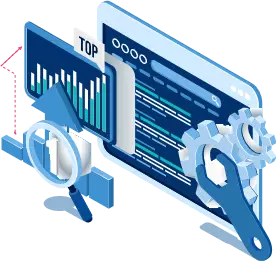Technical SEO
I tackle Technical SEO right at the start because it lays the foundation for everything else. We make sure your site’s structure is solid. That means checking your XML sitemap, improving your core web vitals or site speed. Ensuring mobile and tablet friendliness, setting up Schema Markup and all the essentials to help search engines and users navigate your site smoothly.
Let’s create a strong foundation for SEO success.
Why Does Technical SEO Matter?
Technical SEO pertains to processes applied to a website’s code and structure with the goal of improving the visibility of its webpages on search engines for keywords that represent its content. There’s a host of technical elements in every website that can be optimized for better SEO performance, but they can be placed primarily under three categories:
- Performance Optimizations. These are optimizations applied to improve user experience by ensuring availability, fast page load times, proper display across multiple device types, and more.
- Crawlability Optimizations. These are optimizations that promote the proper crawling of search engine spiders from one web page to another in a given website. The goal is to allow search spiders to find and index public-facing pages while keeping pages that aren’t intended for search off of indices.
- Security Optimizations. These are optimizations aimed towards keeping both the website and its users safe from privacy risks, malicious software and fraudulent activities online.

- User Experience. Search engines want to feature websites that are always available, fast-loading and compatible with any type of device. These qualities promote better user experience, incentivizing repeat usage visits to both the search engine and the websites it refers.
- Bot Crawl Efficiency. Like any other tech company, search engines have finite computing, storage and energy resources. As such, they want to be as efficient in the usage of these resources as they possibly can. By being judicious with the kinds of pages they allow search engines to crawl, websites are often rewarded with greater visibility on the SERPs.
- Safety and Security. It’s in the best interest of every search engine to send its users only to websites that will not compromise their privacy or endanger their devices. As such, Google and other search engines tend to favor websites that use the secure HTTPS protocol. Search engine spiders can also detect malware and spyware, degrading the ability of websites with unwanted software to rank well in their search results.
Technical SEO focuses on the backend of your website to ensure it’s easily accessible to search engines and provides a great user experience.
How I Work:
A typical SEO audit of a website will usually involve the following activities:
- Robots.txt validation
- Meta robots tag audit
- XML sitemap audit
- Search Console setup
- Internal linking audit
- Site architecture audit
- Crawl error audit
- Broken link audit
- Duplicate Content audit
- Redirect audit
- SSL audit and setup
- Site speed test
- Site speed improvement
- Mobile usability test
- Mobil usability improvement
- Structured data setup
Ensuring your website is technically optimized enhances your ability to compete for relevant keywords tied to your products or services.
FAQ
Common FAQS of Technical SEO?
Many website audit tools offer free versions, providing access to basic features that can help identify common performance and SEO issues. However, these free tiers often come with limitations in functionality, data access, and reporting depth, which may restrict the scope and effectiveness of the audit compared to premium or professional-grade tools.
The choice of website audit tools largely depends on the type of audit you intend to conduct, the size and complexity of your site, and your available budget. Industry-leading platforms like Ahrefs and Semrush offer robust, in-depth auditing capabilities ideal for comprehensive SEO analysis. Additionally, Google's free tools—such as Google Search Console and PageSpeed Insights—are user-friendly and effective for identifying key performance and visibility issues, though they may have limitations in scope compared to premium solutions.
A content audit is a structured evaluation of a website’s existing content aimed at assessing its quality, relevance, and performance. This process involves systematically reviewing all content assets to determine how well they align with business objectives, audience needs, and SEO best practices. The primary goals are to identify gaps or outdated material, optimize content strategy, enhance user experience, and improve overall visibility and engagement across search engines and social media platforms.
Would you like to start a project with me?
Ready to skyrocket your brand’s success? Hire me for cutting-edge SEO, Social Media, PPC, and more. Make the digital leap and see tangible results.
